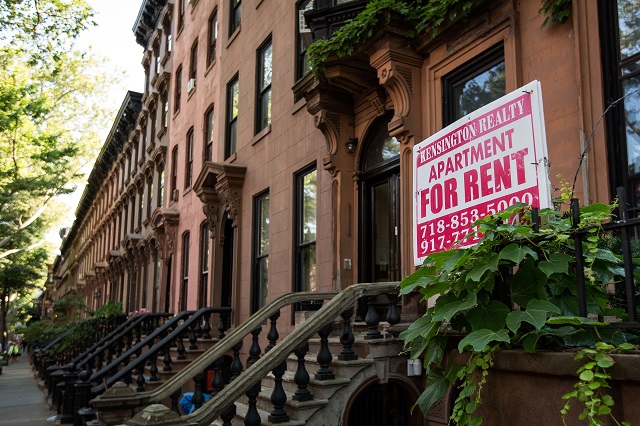
Credit: Drew Angerer / Getty Images
*This piece was originally published on September 20th, 2019*
Picking up and moving to new opportunities has always been a part of the American dream. But, says Tamim Bayoumi, a deputy director at the International Monetary Fund and a co-author of the paper “Stranded! How Rising Inequality Suppressed US Migration and Hurt Those Left Behind,” that narrative has shifted in modern America. As well-paying jobs are increasingly concentrated in cities with high living costs, some Americans find themselves unable to pursue the careers that could most help them and their families.
Three Key Takeaways:
- House prices have generally increased across the board in the last 40 years, but they’ve risen much faster in more prosperous regions. This trend has created a financial challenge for those trying to move to better-off cities. Being shut out of expensive locations can have long-term impacts on families, since moving to places with more opportunities has been linked to greater lifetime achievements for children.
- Up until the 1980s, incomes and housing prices across regions of the U.S. were far more similar. However, about 40 years ago, Americans began seeing huge geographical divergences. Bayoumi argues this can be traced to technology, since tech created higher incomes for the well educated and erased many well-paying, middle-class jobs.
- When it comes to bringing jobs back to less prosperous regions, current research suggests we should provide targeted, skills-based assistance to both workers and employers. Meanwhile, in more expensive places, Bayoumi points to improving both local zoning laws and transportation, which would allow people with a wider variety of incomes to access the city’s resources.
Listener Responses:
- “High housing costs have us spending approximately 20% of our gross income on housing (no tears, it's well-taken that many less fortunate people are at 50%+), and for that we're getting about 775 square feet... Having enough space for a family is directly impacted by housing costs and childcare is indirectly related. Even if career advancement goes flawlessly, it is difficult for us to imagine having a family in this city. More broadly, the choking traffic and unreliable and expensive transit, make the alternative to living in the city hard to stomach as well. Adding two hours a day to an 11-12 hour working day leaves little time to enjoy life.” (Stu Cameron, Boston, MA)
- “When I graduated from law school, I started working for the courts, and I didn't make very much so I was able to get into a subsidized housing program. Then I got a job at a law firm and started making a little bit more — not a lot more, but just over the cut off for this program. I couldn't afford to live anywhere that I felt was safe after that. I have a young daughter, so my parents moved out here somewhat recently about 30 miles away. They offered to let us move in with them and we did that.” (Brian Walton, D.C.)
- “It is true that, despite my comfortable circumstances, when I go to downsize, I won’t actually be able to afford Cambridge. But I’ll be okay. I worry about the younger folks who are increasingly unable to stay in Cambridge. And that’s why I will continue to fight to increase the housing supply.” (Saul Tannenbaum, Cambridge, MA)
- “There's a flip side to your query about people having to commute hours because they can't afford housing near their work. I was lucky enough to buy my house in Silicon Valley many years ago, so my housing costs are below average. But my new company decided it would be cheaper to open their Silicon Valley branch office in the East Bay, so I have a long reverse commute to get to my job.” (Clem Wang, Silicon Valley, CA)
- “We opted to buy a house in Salem, which is one of the few communities that we could afford along the commuter rail. I drive 3-4hrs round trip and my husband takes the train for about the same amount of time (if it’s functioning). In my nonprofit agency, we make so little that no one that works there can afford to live there, but yet we all commute to provide services to people in the city. Our pay is based on state contracts, which pay the same if we were in the city or rural western MA. It’s unsustainable for everyone.” (Jillian Nebesar, Salem, MA)
More Reading:
- If we can’t afford to live in the city, many of us live just outside it and commute, but “just outside” is a region that expands every time we find a way to get around faster. A proposed hyperloop system could be the next step to living hundreds of miles from your office and still making it in by 9 a.m. However, a New York Times article has a more skeptical take on the impact a system like this would have.
- When it comes to expensive housing, young people often hear advice from older generations on how to afford it by saving money, cutting back, and planning ahead. Not all of that advice is useful or practical, though. CNBC talked with a former Wall Street exec to get her advice on putting money away and she offered a simple formula to follow, including how much should be going to your rent.
- New York City is a famously expensive place to live, and it may have reached a breaking point. Bloomberg reports that one million people have left the region in the last nine years, averaging almost 300 people moving out every day. Some are concerned that this exodus will make the entire system crumble.

